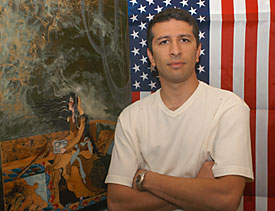 |
|
KEVIN KLAUS/Arizona Daily Wildcat
|
Iranian and former UA instructor Jamal Tabatabai has recently been told that he no longer is a citizen of the U.S. Although he has lived here in the U.S. since age 12, INS officials recently revoked Tabatabai's citizenship because of his divorce.
|
|
By Jose Ceja
Arizona Daily Wildcat
Thursday January 16, 2003
Six-day detainment puts teacher's life on hold until deportation hearing
On Dec. 13, students in Jamal Tabatabai's Persian class arrived on time to take their final, but their instructor never brought it ¸ he never even came.
Earlier that morning, Tabatabai, a former UA
instructor, went to the Immigration and Naturalization Services office to register as a part of a new national security program established after Sept. 11.
Tabatabai, who has lived in the United States for 18 years, said he pleaded with INS officials to let him return to work but instead was led to a detention center where he was questioned. It wasn't until then that he was informed his status was changed to that of a visitor because of his divorce from an American.
He was then taken to a 30-by-30 foot room with about 60 other people for most of the day and not given anything to eat but a small cheeseburger.
"I went through the worst 12-15 hours you could possibly imagine," he said.
Tabatabai's ordeal lasted six days, during which he was held at various detention facilities in Tucson.
During that time, he said he was not allowed to contact his family. It wasn't until his brother called police and INS officials that Tabatabai's family learned of his whereabouts.
After a total of six days in detention and thousands of dollars in lawyer's fees, Tabatabai was released.
Although he sympathizes with the United States' need for increased security in the wake of the Sept. 11 attacks, Tabatabai believes the new policies more closely resemble Japanese-American detention camps than sensible security measures.
"We all come here for a reason ÷ for a better life, for freedom of speech and religion. But they are taking that away."
With his work permit expired, driver license and other identifications confiscated, Tabatabai said all he can do is prepare for his deportation hearing set for April 9.
"I have been here for 18 years, and they've taken every thing I have ever worked for away," he said.
The number of people detained by the INS under the program, which is meant to identify male citizens of 20 high-risk countries, and is called the National Security Entry-Exit Registration System, is unknown.
The INS won't release the information on the number of people detained under the program, which was enacted Sept. 12, 2001.
About 45 Tucsonans and UA members protested in front of the Tucson INS office Friday afternoon in response to the detention of Tabatabai and others.
Campus groups like Students Against Sweatshops, the Alliance of Peace and Justice in the Middle East, and the Iranian Students Association were all involved in the protest.
Rachel Wilson, a UA research technician and one of the organizers of the protest, said she is concerned that detainees such as Tabatabai are being denied their basic rights with those detentions.
Wilson said the policy unfairly targets Muslims and denies detainees due process.
They also plan to press the university to take a position on the detentions, Wilson said.
While Wilson said she understands the need for increased security after the Sept. 11 attacks, she said the detentions and deportations of men like Tabatabai are excessive.
"Tightening security is one thing," she said. "Rounding up and deporting is something different."
Despite his ordeal, Tabatabai said he feels lucky that he had the legal resources to help him be released but said others aren't as fortunate.
"A lot of people don't have these (lawyer) connections," he said. "Not everyone can afford to hire a lawyer, which is what you need. I am absolutely sure that if it wasn't for that, I would still be there, too."
The INS was unavailable for comment.

